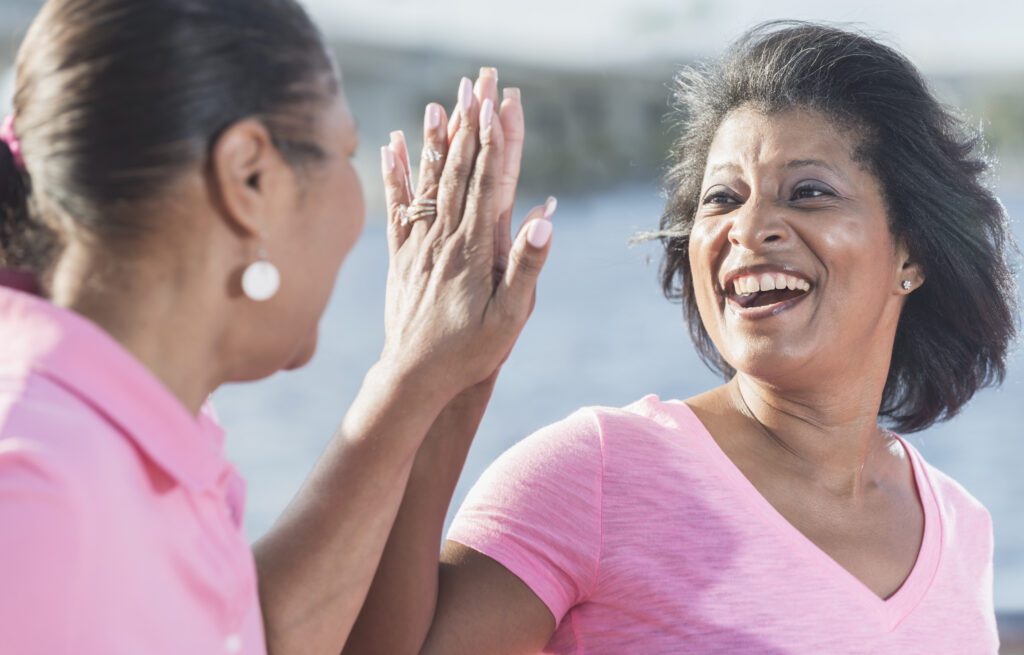When it comes to breast cancer, there is no one way to fully protect yourself. However, there are steps you can take to help you figure out how to reduce your risk of breast cancer.
Some risk factors, such as being a woman, aging, and family history cannot be changed. But there are changes you can make to your lifestyle which can help lower your risk. Maintaining a healthy lifestyle and getting regular screenings for breast cancer with mammograms and an Accelerated Breast MRI (AB-MRI) will help you make the most of your breast cancer prevention.
Steps to Reduce Your Risk of Breast Cancer
When it comes to your health, you want to limit as many risk factors as possible. A risk factor is anything that increases your chances of getting a disease. Having a risk factor doesn’t guarantee you will get a disease, but it does increase your chances. To help reduce your risk of breast cancer, the American Cancer Society suggests you follow these guidelines to better protect your breast health:
Limit Your Alcohol Intake
According to the American Cancer Society, “Research has shown that women who have 2 to 3 drinks a day have about a 20% higher risk compared to women who don’t drink at all.” To decrease your risk of breast cancer, limit your alcohol intake to no more than 1 drink a day.
Watch Your Weight
Being overweight can lead to many health problems. For women who are going through menopause, most of the body’s estrogen comes from fat tissue. This raise in estrogen levels can increase your risk of getting breast cancer. Women who are overweight can also see higher insulin levels which are linked to breast cancer and other forms of cancer. To reduce this risk, you want to maintain a healthy weight.
Stay Physically Active
Getting regular exercise can help you maintain a healthy weight which lowers your risk of getting breast cancer. Staying physically active not only helps with body weight, but it can also have a positive effect on your hormones and inflammation. The American Cancer Society recommends you get at least 150 minutes of moderate-intensity activity or 75 minutes of vigorous activity spread throughout the week.
Limit the Use of Hormone Therapy
Hormone replacement therapy was commonly used in the past for menopausal symptoms. Researchers have now limited the use after discovering a combination of estrogen and progestin may be linked to breast cancer. To be safe, talk to your doctor about any hormonal therapy and its link to breast cancer.
Reduce Your Risk of Breast Cancer with Regular Screenings
An important way to reduce your risk of breast cancer is to catch it before it can spread. It’s crucial for women over 40 to regularly screen for breast cancer with an annual mammogram and AB-MRI screening. Although cancer screenings cannot prevent the risk of breast cancer, they can help find early signs of breast cancer making it easier to treat.
A mammogram is an x-ray of the breast which helps detect breast cancer early. Mammograms are very effective and should be received annually, but in some cases, women will also need an AB-MRI screening.
The Accelerated Breast MRI is radiation-free and important for women that have a higher risk of developing breast cancer, such as those with dense breast tissue. The AB-MRI uses a powerful magnetic field and radiofrequency pulses to take highly detailed images of the breast even discovering hard to see tumors in dense breast tissue.
Whether breast cancer runs in your family, or you just want to take extra precaution, maintaining a healthy lifestyle and following the above steps at any age can help reduce your risk of breast cancer. However, if you’re over 40, it’s important to screen for breast cancer as well to fully ensure you’re taking every step to protect yourself.
At American Health Imaging, our goal is to provide you with the best state of the art breast cancer imaging so you can continue to live your life with confidence. Contact us today to set up an appointment for a breast cancer screening or talk to your doctor to learn more.
